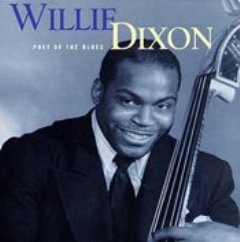Willie Dixon – Poet Of The Blues (1998)
Willie Dixon – Poet Of The Blues (1998)

1. Back Door Man 2. I Can't Quit You Babe 3. Seventh Son, The 4. Spoonful 5. I Ain't Superstitious 6. I'm Your Hoochie Cooche Man 7. Little Red Rooster, The 8. Big 3 Stomp 9. I Ain't Gonna Be Your Monkey Man 10. It's All Over Now 11. If the Sea Was Whiskey 12. O.C. Bounce 13. Money Tree Blues 14. Cool Kind Woman 15. Juice Head Bartender 16. Signifying Money Musicians: Willie Dixon - Arranger, Bass (Upright), Composer, String Bass, Vocals The Big Three Trio - Vocals Hillard Brown - Drums Ollie Crawford - Composer, Guitar Clifton James - Drums Charles Sanders - Drums Johnny Shines - Guitar Sunnyland Slim - Piano
Willie Dixon's writing not only lit the night fires in 1950s Chicago's South Side, where he was Chess Records' outstanding house writer and resident bassist, but his handiwork burned a smoke hole in the spectacular British Invasion five to ten years later -- an aftershock bigger than the original earthquake. One by one, 1963 Blighty bands turned to his catalog as an R&B launching point, until his songs became more identifiable with the Rolling Stones, Yardbirds, and Pretty Things (and later, Yardbirds offshoots Cream and Led Zeppelin), than they did with the raunchier, meaner originals by Chess' bigger talents (Howlin' Wolf, Muddy Waters, Bo Diddley, Otis Rush, and Little Walter). What is less known is that, like his contemporary Otis Blackwell and, later, Burt Bacharach, Dixon recorded his own versions of the songs that made stars of others. In fact, his recording career began way back in 1946 with the Big Three Trio, first for Bullet Records, and then with Columbia. Columbia had him again in 1970, during the blues/R&B/'50s rock & roll revival, when Dixon assembled the Blues All-Stars to belt more relaxed yet down-and-dirty, funkier versions of his classics. Seven tracks from that LP, I Am the Blues, open this CD, the throaty-voiced Dixon showing off impeccable timing on bass and his gentlemanly howling, taking a belated bow on such favorites as "Back Door Man," "Little Red Rooster," "The Seventh Son," "I'm Your Hootchie Coochie Man," and "I Can't Quit You Baby." If Dixon is not the wild, unfettered talent that his Chess singers were -- these takes aren't as rough or as hot -- he cuts it just the same, with style. Thereafter, Poet visits Dixon's earliest studio forays over two decades prior. The contrast is marked, but not difficult to digest. Coming off as the spiritual cronies of Ivory Joe Hunter, Big Joe Turner, Professor Longhair, and other R&B giants of the late '40s, the Big Three trio is much jauntier, danceable, and less hulking than Dixon's 1970 stuff. You can imagine sailors swinging their ankles in gin joints to this boogie swing. You can also envision the booze a-pouring and the sweat a-flying in the hip dives of 1940s darktown, as the pumping piano, engine motor guitar, and slap-dash drums keep the jittery bounce coming underneath the sweet harmonies. Though most will head for the famous tunes from 18-23 years later, it is the 1947-1952 Big Three sessions that prove the most interesting historically, a sound more lost to modern ears than the traditional blues that proceeds it. Either way, Dixon shows why he's a beloved musical hero to musicians and scholarly fans. ---Jack Rabbit
download: uploaded anonfiles mega 4shared mixturecloud yandex mediafire ziddu
Last Updated (Friday, 19 July 2013 20:01)








